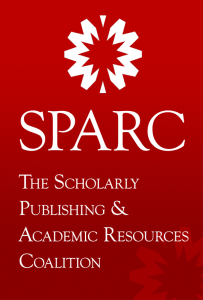 SPARC press release, Link (CC-BY)
SPARC press release, Link (CC-BY)
Contact: Ranit Schmelzer
202-5380-1065 | sparcmedia@arl.org
Washington, DC –The Senate Homeland Security & Governmental Affairs Committee (HSGAC) today passed S. 779, the Fair Access to Science and Technology Research (FASTR) Act, unanimously by voice vote and moved it to the full Senate for consideration. This marks the first time the Senate has acted on a government-wide policy ensuring public access to the results of publicly funded research, and is an important step towards codifying the progress made by the 2013 White House OSTP Directive.
FASTR calls for federal agencies with extramural research budgets in excess of $100 million to establish consistent, permanent public access policies for articles reporting on their funded research making articles freely available to the public no later than twelve months after publication – and preferably sooner.
“SPARC is encouraged by today’s bipartisan action by the Senate Homeland Security Committee, which signals strong support for the principle of public access to taxpayer funded research,” said Heather Joseph, Executive Director of the Scholarly Publishing and Academic Resources Coalition (SPARC). “The ultimate passage of FASTR will ensure a stable path for greater innovation and economic growth by opening up access to publicly funded research, regardless of the position any given Administration.”
“FASTR represents the next step forward in the competitiveness agenda, while protecting classified research and royalty generating works. It harnesses the Internet allowing us to take advantage of the digital environment to disseminate the results of publicly funded research.”
“While we recognize this is just the first step in a long process, it is a significant one. We call on all Members of Congress to follow the Committee’s lead and will work closely with them as FASTR progresses.”
Background
Every year, the federal government funds tens of billions of dollars in basic and applied research. Most of this funding is concentrated within 11 departments/agencies (e.g. National Institutes of Health (NIH), National Science Foundation (NSF), Department of Energy) and the research results in a significant number of articles being published each year – approximately 100,000 papers are published annually as a result of NIH funding alone. Because U.S. taxpayers directly fund this research, they have a right to expect that its distribution and use will be maximized, and that they themselves will have access to it.
The government funds research with the expectation that new ideas and discoveries resulting from that research will advance science, stimulate innovation, grow the economy, and improve the lives and welfare of Americans. The Internet makes it possible to advance these goals by providing public online access to federally funded research, and has revolutionized information sharing by enabling prompt sharing of the latest advances with every scientist, physician, educator, entrepreneur and citizen.
One of the critical challenges faced by industry today is gaining quick access to research for commercial application, to spur investment in development of new innovative products. Businesses – small and large – need faster access to this information to be competitive in the global marketplace.
In February 2013, the White House Office of Science and Technology Policy (OSTP) issued a Directive, that requires the results of taxpayer-funded research – both articles and data – be made freely available to the general public with the goal of accelerating scientific discovery and fueling innovation. To date, 13 agencies and departments have released their initial plans. However, as is always the case, the OSTP Directive can be overturned by a subsequent Administration.
###
SPARC®, the Scholarly Publishing and Academic Resources Coalition, is an international alliance of academic and research libraries working to correct imbalances in the scholarly publishing system. Developed by the Association of Research Libraries, SPARC has become a catalyst for change. Its pragmatic focus is to stimulate the emergence of new scholarly communication models that expand the dissemination of scholarly research and reduce financial pressures on libraries. More information can be found at www.sparc.arl.org and on Twitter @SPARC_NA.




